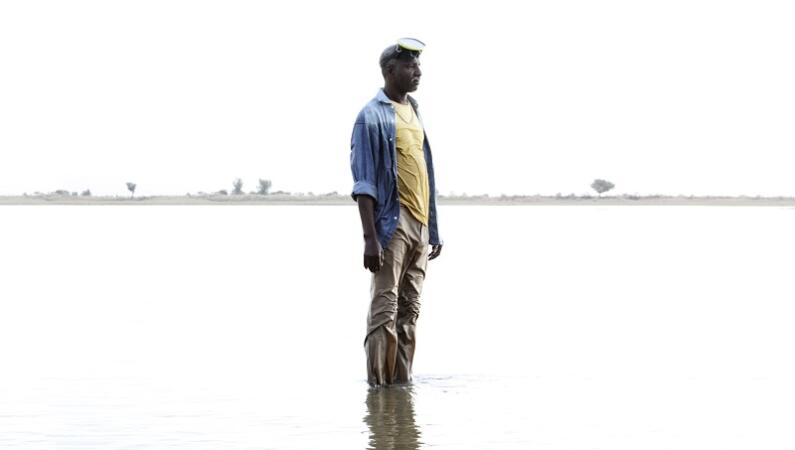
As you’re probably aware, if you were anywhere near this site earlier in 2010, Mahamat Saleh Haroun’s “Un Homme Qui Crie” (“A Screaming Man”) won the Jury Prize at the Cannes Film Festival that year.
The third in what could be said to be a trilogy of father-son themed films following “Abouna” (2002) and “Daratt” (2006), “A Screaming Man” is once again set in modern day Chad and, like “Daratt,” is set against the backdrop of war.
However, as is usual with Haroun’s films, loud, physical and external conflict is absent from the screen and attention placed, instead, on the quiet, internal conflict of man – in this instant, one man, Adam (aka Champ) played admirably by Youssouf Djaoro, a former national swimming champion, now a swimming pool attendant in a hotel which caters to white ex-pats, UN soldiers and wealthy Chadians, and now recently, and quite appropriately for modern day Africa, Chinese owned.
Adam is assisted by his son, Abdel (French actor Diouc Koma) and looks set to glide blissfully into retirement, resting on his laurels until it’s time for his son to take over the hotel pool.
However, Madame Wang (Heling Li), the hotel owner, has other ideas, turning Adam’s contentment into turmoil; his demotion to gatekeeper highlighting and exaggerating his conceit with the hilariously short and tight fitting uniform he’s forced to wear, a stark contrast to the hitherto crisp yet casual white shorts and t-shirt he admonishes his son for not keeping clean.
Unlike “Abouna” and “Daratt,” the father-son legacy in “A Screaming Man” presents us with a father who has neither abandoned his family nor who has died in warfare, but one who is not only present, but also seen to be very loving and tender with both his wife (Hadje Fatime N’Goua) and son, while still maintaining his place as head of the family with dignity, pride and discipline.
While in “Abouna” and “Daratt” we’re presented with sons on a quest to uphold family union and loyalty in the absence of a father, in “A Screaming Man,” it’s the father himself who abruptly brings to a halt the notion of any father-son legacy, especially one that does not place him front and centre and, despite Adam’s hitherto peaceful demeanor and his lack of interest in the progress of the war, suddenly it becomes a useful tool with which to fight his own battles – alas, to disastrous effect.
It’s Adam’s former colleague, David (Marius Yelolo), the former hotel cook who loses his job in the reshuffle and who later goes on to become fatally ill, who shows an alternative way for man to deal with his own sense of entitlement, a sense of entitlement that generally leads to discord and destruction far beyond each man’s immediate person.
While coming to terms with his own plight with a calming mix of humor and philosophy, David, in a moment of blasphemous yet matter of fact despair, takes God out of the equation, indirectly laying the responsibility of man’s fate in man’s own hands. This makes the events that occur as a result of Adam’s actions all the more harrowing and yet, despite man’s ill conceived plans, the legacy of inheritance, regardless of what form it might take, does not end, and this is brought home to Adam by his son’s girlfriend (Djénéba Koné), causing much contrition and regret on Adam’s part.
Too late, perhaps for Adam and Abdel, but the legacy nonetheless continues.
“A Screaming Man” – an elegant character study of father & son – screens this weekend in NYC, Sunday, April 23, and again on Tuesday, April 25, at the Metrograph. Ticket info here.
Trailer below:

